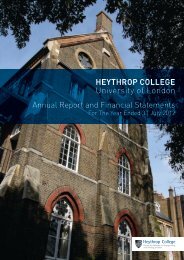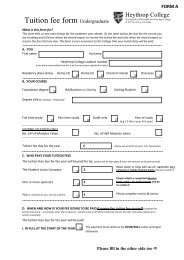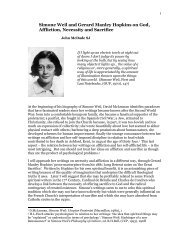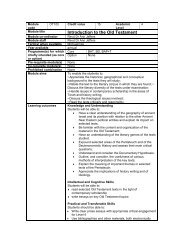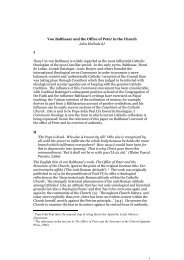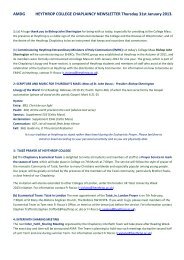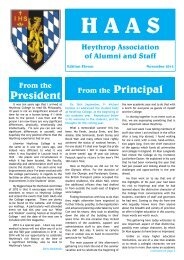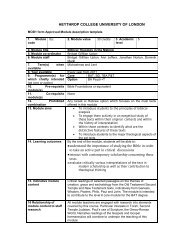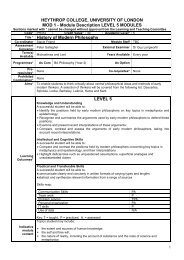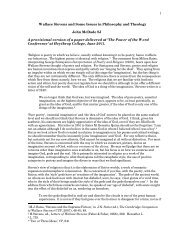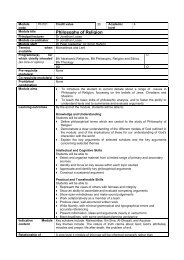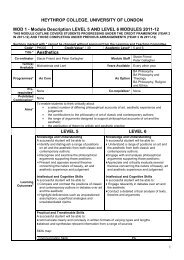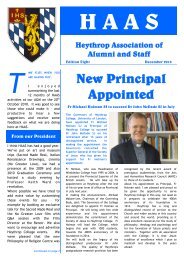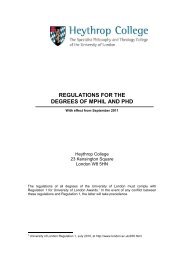Academic Regulations for first degrees and ... - Heythrop College
Academic Regulations for first degrees and ... - Heythrop College
Academic Regulations for first degrees and ... - Heythrop College
Create successful ePaper yourself
Turn your PDF publications into a flip-book with our unique Google optimized e-Paper software.
Section 4: Graduate Certificates <strong>and</strong> Diplomas<br />
Scope of these regulations:<br />
This section applies only to the Graduate Diploma in Theology<br />
Graduate Diploma in Theology<br />
The Graduate Diploma in Theology is a programme <strong>for</strong> graduates, which is<br />
assessed at the level of a <strong>first</strong> degree. These regulations should be read in<br />
conjunction with the General <strong>Academic</strong> <strong>Regulations</strong> (section 1) <strong>and</strong> the General<br />
Assessment <strong>Regulations</strong> (section 2).<br />
36 Entrance Requirements The programme closed to new entrants from<br />
September 2009<br />
36.1 Applicants must normally have a <strong>first</strong> degree or equivalent qualification in<br />
a subject other than Theology.<br />
37 Programme of Study<br />
37.1 Students are required to attend either a full-time programme of study<br />
approved <strong>for</strong> this purpose by the <strong>College</strong>, extending over one calendar year, or a<br />
part-time programme of study extending over two calendar years.<br />
37.2 The programme consists of three whole modules (or the equivalent number<br />
of whole <strong>and</strong> half modules) <strong>and</strong> a Dissertation of up to 8000 words on an<br />
approved topic, prepared under supervision.<br />
37.3 Modules are chosen by the student <strong>and</strong> approved by the Diploma Convenor<br />
from the available modules in the BA Theology, excluding beginners’ modules in<br />
ancient languages. No more than two of the three modules (or equivalent in half<br />
modules) may be at level 4 (taken from the <strong>first</strong> year of full-time study in the <strong>first</strong><br />
degree programmes). A student may take a beginners’ language module<br />
concurrently with or in preparation <strong>for</strong> Diploma studies, <strong>and</strong> will normally be<br />
charged a module fee <strong>for</strong> this.<br />
37.4 A student may be permitted to take a module which is subject to a<br />
prerequisite without that prerequisite if he or she has provided documentary<br />
evidence to satisfy the Module Teacher that he or she has prior knowledge <strong>and</strong><br />
underst<strong>and</strong>ing, at an appropriate level, which <strong>for</strong>ms a sufficient preparation to<br />
study the module. A full-time student may take a module <strong>and</strong> its required prerequisite<br />
simultaneously at the discretion of the Module Tutor(s), on condition<br />
that he or she completes appropriate preliminary reading be<strong>for</strong>e the beginning<br />
the module.<br />
37.5 Part-time students normally attend <strong>and</strong> are assessed in two modules in<br />
their <strong>first</strong> year of study, <strong>and</strong> one module <strong>and</strong> the Dissertation in the second year<br />
of study.<br />
38 Assessment<br />
38.1 Each module is assessed as defined in the approved module outline,<br />
normally by a combination of coursework required to be completed during the<br />
term(s) in which the module is taught, by dates published to students, <strong>and</strong> an<br />
28



